Hospitality
Trends 2021
February Issue, 2021
Trends to Chase: How hoteliers can stay relevant in 2021.
Two months into the new year, it is now clear that the challenges 2020 brought did not end with it. As the saying goes, the only way out is sometimes through, and the only way out of a pandemic is by acknowledging and navigating through it. The best way to move forward now is to identify the trends set by COVID-19 and adapt to them. This article lays out the trends set by COVID-19 and how hoteliers can incorporate the changes to kick-start the industry.
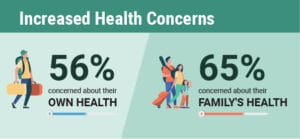 It comes as no surprise that as the hospitality sector reopens, customers will be more concerned about hygiene and safety. This is one of the main reasons why, even as countries reduced travel restrictions, citizens were not too eager to resume their travel plans. In fact, research by Deloitte showed that 56% of people worldwide have health concerns regarding their own well-being and 65% remain concerned for the health of their family.
In order to attract guests in 2021, establishing trust will be of paramount importance. Customers need to be assured by hoteliers that the hotel is taking every possible action to protect their health. To this end, merely following health protocols will not be sufficient. Those in the hospitality sector must actively communicate with existing and potential customers and inform them of the safety measure in place.
It comes as no surprise that as the hospitality sector reopens, customers will be more concerned about hygiene and safety. This is one of the main reasons why, even as countries reduced travel restrictions, citizens were not too eager to resume their travel plans. In fact, research by Deloitte showed that 56% of people worldwide have health concerns regarding their own well-being and 65% remain concerned for the health of their family.
In order to attract guests in 2021, establishing trust will be of paramount importance. Customers need to be assured by hoteliers that the hotel is taking every possible action to protect their health. To this end, merely following health protocols will not be sufficient. Those in the hospitality sector must actively communicate with existing and potential customers and inform them of the safety measure in place.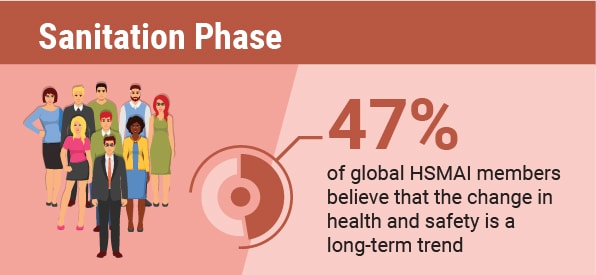 Combined with customers’ health concerns, are the government issued health guidelines issued, which calls for rigorous sanitisation practices. Whereas previously, hoteliers would market their exquisite services and amenities, the focus has now shifted to cleanliness and hygiene.
Since Deloitte shows that only 33% of people worldwide now feel safe staying in a hotel, hoteliers’ marketing strategies of 2021 must focus on building the confidence to attract more guests. While the cleaning procedures of a hotel was a backstage action, the new trends set by COVID-19 brings them to the centre-stage.
38% of global HSMAI members believe that the change in health and safety is the most significant trend, and 47% believe that this trend is here to stay in the long run. Given this trend’s longevity, hoteliers will now have to shift gears towards a more hygiene-based marketing approach.
Combined with customers’ health concerns, are the government issued health guidelines issued, which calls for rigorous sanitisation practices. Whereas previously, hoteliers would market their exquisite services and amenities, the focus has now shifted to cleanliness and hygiene.
Since Deloitte shows that only 33% of people worldwide now feel safe staying in a hotel, hoteliers’ marketing strategies of 2021 must focus on building the confidence to attract more guests. While the cleaning procedures of a hotel was a backstage action, the new trends set by COVID-19 brings them to the centre-stage.
38% of global HSMAI members believe that the change in health and safety is the most significant trend, and 47% believe that this trend is here to stay in the long run. Given this trend’s longevity, hoteliers will now have to shift gears towards a more hygiene-based marketing approach.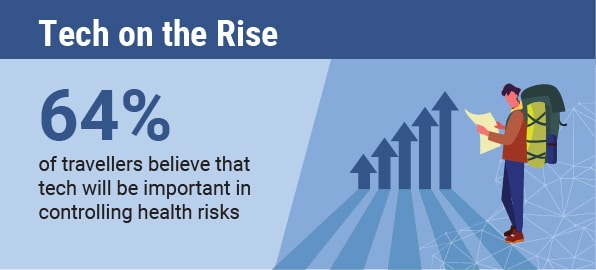 One key aspect brought on by COVID-19 is the need to reduce touchpoints. This brings contactless interactions, digitised experiences, and virtual reality to the forefront. Of course, in the age of a digital revolution, the adoption of technology is inevitable. However, the pandemic undoubtedly accelerated the pace of adoption.
Regardless of the pandemic, adopting technology brings with it a host of advantages to hoteliers. In a post-COVID era, technology will be pivotal in gaining the trust of the guests. Recent studies have shown that 64% of travellers believe that tech will be important in controlling health risks, 36% would feel safer if they could check the location through VR before travelling, and 63% want hotels to utilise the latest tech to ensure their safety. Even simple and low-cost methods such as automatic doors and QR code scans can prove a worthy difference.
One key aspect brought on by COVID-19 is the need to reduce touchpoints. This brings contactless interactions, digitised experiences, and virtual reality to the forefront. Of course, in the age of a digital revolution, the adoption of technology is inevitable. However, the pandemic undoubtedly accelerated the pace of adoption.
Regardless of the pandemic, adopting technology brings with it a host of advantages to hoteliers. In a post-COVID era, technology will be pivotal in gaining the trust of the guests. Recent studies have shown that 64% of travellers believe that tech will be important in controlling health risks, 36% would feel safer if they could check the location through VR before travelling, and 63% want hotels to utilise the latest tech to ensure their safety. Even simple and low-cost methods such as automatic doors and QR code scans can prove a worthy difference.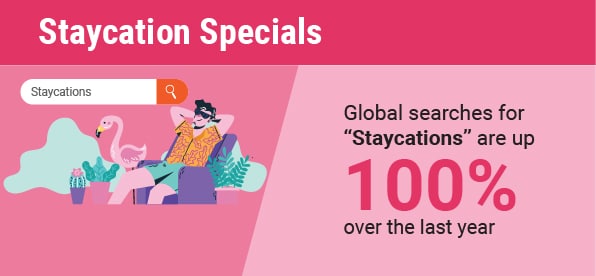 In a day and age where airline travel restrictions loom every corner and crossing boundaries has become tedious, if not impossible, it is hardly surprising that vacations in one’s home country, or staycations, are rising in popularity. According to Google, global searches for “staycations” are up 100% over the last year. Given the risk of travel and the cost-effectiveness of local travel, staycations will remain until the pandemic unrest settles down.
On the one hand, lockdowns have driven people to want to travel somewhere. Yet the financial and health concerns have greatly limited their options. Most post-COVID staycationers are looking for a change of scenery; they are seeking safe and creative getaways. From spa-style bathrooms to outdoor patios, hotels can offer their guests the ultimate experience within the hotel and focus their marketing on attracting staycationers.
In a day and age where airline travel restrictions loom every corner and crossing boundaries has become tedious, if not impossible, it is hardly surprising that vacations in one’s home country, or staycations, are rising in popularity. According to Google, global searches for “staycations” are up 100% over the last year. Given the risk of travel and the cost-effectiveness of local travel, staycations will remain until the pandemic unrest settles down.
On the one hand, lockdowns have driven people to want to travel somewhere. Yet the financial and health concerns have greatly limited their options. Most post-COVID staycationers are looking for a change of scenery; they are seeking safe and creative getaways. From spa-style bathrooms to outdoor patios, hotels can offer their guests the ultimate experience within the hotel and focus their marketing on attracting staycationers.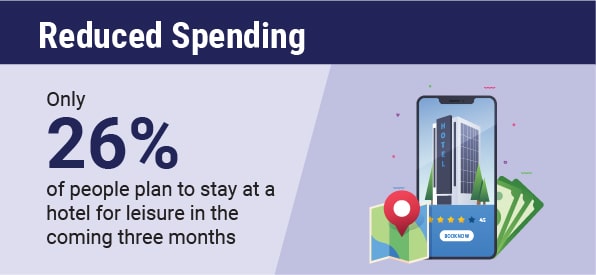 In uncertain times, it is common for people to reduce their discretionary spending. Following suit, COVID-19 has also forced people to prioritise and limit their spending. Only 26% of people plan to stay at a hotel for leisure in the coming three months, and they plan to spend 20% less on restaurants. Instead, consumers’ focus has unsurprisingly shifted to the more essential items such as groceries and household goods.
These statistics suggest that business as usual while not be resuming anytime soon. However, that is not to say that all hope is lost. Hoteliers can turn their marketing efforts towards promoting more affordable local travel. Offers, promotions and quantity discounts can provide a pocket-friendly option to travellers in 2021.
In uncertain times, it is common for people to reduce their discretionary spending. Following suit, COVID-19 has also forced people to prioritise and limit their spending. Only 26% of people plan to stay at a hotel for leisure in the coming three months, and they plan to spend 20% less on restaurants. Instead, consumers’ focus has unsurprisingly shifted to the more essential items such as groceries and household goods.
These statistics suggest that business as usual while not be resuming anytime soon. However, that is not to say that all hope is lost. Hoteliers can turn their marketing efforts towards promoting more affordable local travel. Offers, promotions and quantity discounts can provide a pocket-friendly option to travellers in 2021.Want to know how IDS Next products will benefit your property?
